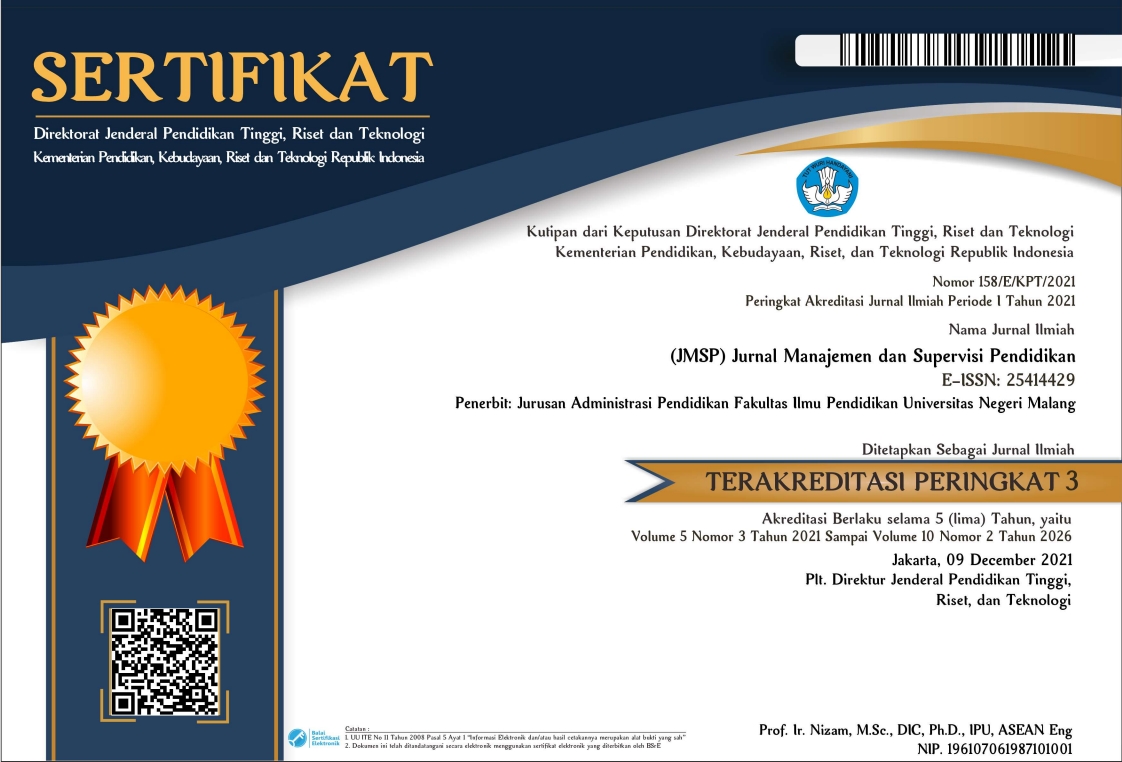The leadership of the Kiai in Facing the Globalization of Education in Islamic Boarding School
Abstract
Keywords
Full Text:
PDFReferences
Arifin, Zainal. Kepemimpinan Kiai Dalam Ideologisasi Pemikiran Santri Di Pesantren-pesantren Salafiyah Mlangi Yogyakarta. Inverensi: Jurnal Penelitian Sosial Keagamaan, Vol. 9, no. 2, (2015).
Azra, Azzumardi. Pendidikan Islam di Era Globalisasi Peluang dan Tantangan, Bunga Rampai Mereka Bicara Pendidikan Islam. (Jakarta : Raja Grafindo Persada, Cet. I, 2009).
Fazriel, Armhela dkk. “The Roleof Leaderin Employee Performance Achievement Studies,in Employment Board Regional Malang,” Journal Administrasi Publik, Vol. 2, No. 4, (2015).
Goleman dkk. Primal Leadership: Realizing the Power of Emotional Intelegence. (Boston: Harvard Bussines SchoolPress, 2002).
Karim, Abdul. Kepemimpinan dan Menejemen Kiai dalam Pendidikan Studi Kasus pada Pesantren Bendakerep. Gedongan dan Buntet Cirebon (Cet. I), (Perpus SPS UIN Syahid: Yayasan Hubbul Wathon, 2018).
Khotimah, Khusnul. “Islam dan Globalisasi: Sebuah Pandangan tentang Universalitas Islam” Komunika, Vol. 3, No. 1, (2009): 114-132.
Lano, PF. Fungsi Kepemimpinan untuk Mengurangi Sikap Arogansi Pegawai, Journal Ilmu Sosial dan Ilmu Politik, Vol. 4, No. 1, (2016).
Manuati, Dewi I Gusti Ayu. Model Kepemimpinan Efektif, Piramida: Journal kependudukan dan pengembangan sumber daya Manusia, Vol V No. 1, (2009).
Ma’rufah, St. Persepsi Terhadap Kepemimpinan Kiai, Konformitas Dan Kepatuhan Santri Terhadap Peraturan Pesantren, Persona, Jurnal Psikologi Indonesia, Vol. 3, No. 02. (2014).
Moesa, Ali Maschan. Nasionalis Kiai, Konstruksi Sosial Berbasis Agama. (Yoyakarta: LKiS Printing Cemerlang, Cet. I, 2007).
Rivai, Veithzal. Kepemimpinan dan Prilaku Organisasi, (Cet. I). (Jakarta: Raja Grafindo Persada, 2003).
Spradley (1980), Gorman dan Clayton (2005) dalam Lynda M. Baker, Observation: A Complex Research Method, Library Trends, Vol. 55, No. 1, (2006).
Spring, Joul. Globalization of Education. (New York and London: Routledge Taylor & Francis, 2009).
Sulaiman, Kepemimpinan Kiai Dalam Transformasi Pendidikan Islam (Studi Atas Perilaku Kepemimpinan Kiai Dalam Mengelola Pondok Pesantren Di Situbondo), Falasifa, Vol. 7, No. 2, (2016).
Susanto, Edi. Kepemimpinan Kharismatik Kiai Dalam Perspektif Masyarakat Madura, Karsa, Vol. 11, No. 1. (2007).
Wayong, Muhamad. “Sinergi Agama dan Sains: Suatu Paradigma Menuju Era Globalisasi Pendidikan,” Lentera Pendidikan, Edisi X, no. 2, (2007).
DOI: http://dx.doi.org/10.17977/um025v5i22021p61
Refbacks
- There are currently no refbacks.
Copyright (c) 2021 JMSP (Jurnal Manajemen dan Supervisi Pendidikan)

This work is licensed under a Creative Commons Attribution 4.0 International License.









